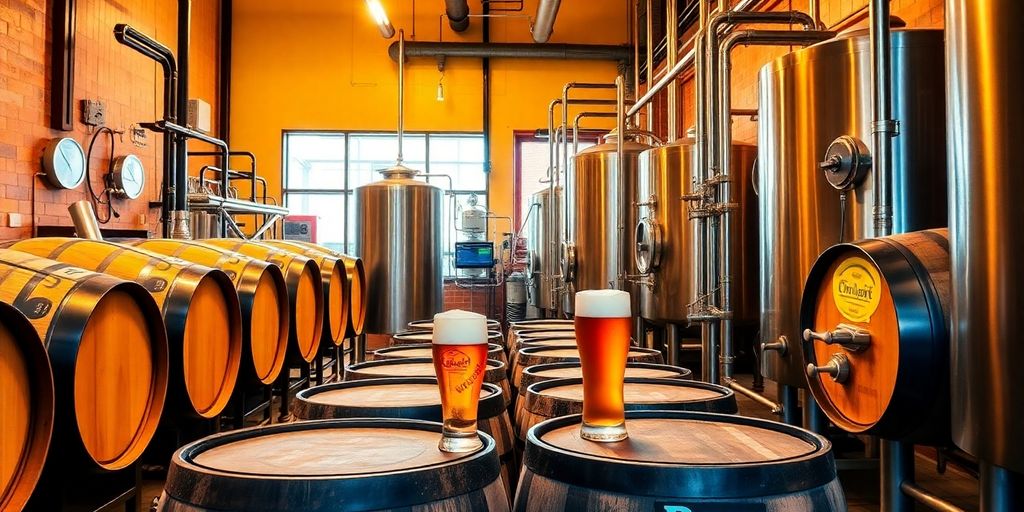Ever wondered how breweries get noticed online? It’s all about SEO, or search engine optimization. For breweries, SEO is like the secret sauce that helps them pop up in search results when people are hunting for a cold one nearby. It’s not just about getting more folks through the door; it’s about making sure your brewery stands out in a crowded market. Whether you’re a small craft brewery or a big name, understanding SEO can make a huge difference. Let’s break it down and see what SEO can do for your brewery.
Key Takeaways
- SEO helps breweries become more visible online, attracting more customers.
- Using the right keywords is crucial for effective SEO in the brewery industry.
- Local SEO is essential for breweries to capture nearby customers.
- Content marketing can boost a brewery’s online presence and engage customers.
- Measuring SEO success requires tracking key performance indicators and adjusting strategies as needed.
Understanding SEO for Breweries

Defining SEO in the Brewery Context
Search Engine Optimization, or SEO, is all about making your brewery more visible online. When people search for breweries, you want yours to pop up first. SEO helps improve your ranking in search results, making it easier for potential customers to find you. It involves tweaking your website content, structure, and other elements so search engines can easily understand what your site is about. For breweries, this might mean including keywords like "craft beer" or "local brewery" in your website text.
Importance of SEO for Craft Breweries
Craft breweries are popping up everywhere, and standing out is crucial. SEO can help you do just that. By optimizing your online presence, you can attract more visitors to your website, and ultimately, your taproom. A well-executed SEO strategy can increase your visibility, bringing in more foot traffic and boosting sales. Plus, it helps build your brand’s credibility. People trust businesses that appear at the top of search results.
Common Misconceptions About SEO
Many think SEO is just about stuffing keywords onto a page, but it’s much more than that. It’s about creating quality content that answers the questions your customers are asking. Some believe results are instant, but SEO is a long game. Changes you make today might not show effects until weeks or months later. Another myth is that once you’re optimized, you’re done. SEO is ongoing, requiring regular updates and adjustments to keep up with changing algorithms and market trends.
Investing in SEO is like planting a tree; it takes time to grow, but once it does, it provides shade and fruit for years to come.
Keyword Research Strategies
Identifying Relevant Keywords
Finding the right keywords is like choosing the perfect hops for your beer—it’s all about balance and flavor. Start by thinking about what your customers might type into a search engine when they’re looking for a brewery like yours. Keywords should reflect your unique offerings and location. Use tools like Google Keyword Planner or SEMrush to see what terms are trending and how competitive they are. Don’t forget to look at what your competitors are using; this can uncover some hidden opportunities. For instance, if other local breweries are focusing on ‘craft beer tours,’ maybe there’s a chance for you to rank with ‘unique brewery experiences.’
Utilizing Long-Tail Keywords
Long-tail keywords are your secret weapon. They’re longer phrases that aren’t searched as often but are highly specific. This means less competition and a better chance of ranking. For example, instead of just ‘brewery,’ try something like ‘family-friendly breweries in Portland.’ These keywords capture the intent of users who are more likely to convert. They might not bring in a flood of traffic, but the visitors they do attract are usually more engaged and ready to act.
Tools for Effective Keyword Research
To get the most out of your keyword research, you need the right tools. Here’s a quick rundown:
- Google Keyword Planner: Great for getting started with basic keyword ideas and checking search volumes.
- SEMrush: Offers competitive analysis and insights into what keywords your rivals are ranking for.
- Ahrefs: Useful for finding related keywords and understanding the difficulty of ranking for them.
Investing in these tools can transform your SEO strategy from guesswork into a science. They help you identify the best keywords to target, making your content more relevant and visible.
Remember, keyword research isn’t a one-time task. Regular updates to your strategy are necessary to stay ahead in the ever-evolving digital landscape.
Optimizing Your Brewery Website
On-Page SEO Techniques
On-page SEO is all about making your website’s content appealing to both search engines and visitors. Start with your titles and meta descriptions; make them catchy and relevant to your brewery. Use keywords naturally in your content, but don’t overdo it—no one likes keyword stuffing. Also, ensure your headings (H1, H2, H3) are structured properly to guide both users and search engines through your content.
Technical SEO Best Practices
Technical SEO might sound intimidating, but it’s essential for a smooth user experience. First, ensure your website loads quickly. Slow sites can drive visitors away and hurt your ranking. Tools like Google PageSpeed Insights can offer insights on speeding things up. Consider these tips:
- Reduce redirects
- Optimize image sizes
- Use browser caching
Also, make your site mobile-friendly. With more people browsing on phones, a responsive design is key. Google uses a mobile-first indexing approach, so a mobile-friendly site is crucial for good rankings.
Creating a User-Friendly Experience
User experience is at the heart of a successful website. It’s not just about aesthetics; it’s about how easily visitors can find what they need. Ensure your navigation is intuitive—think drop-down menus for categories or a clear header navigation. Group related content logically, like having separate pages for different beer styles or events.
Your website should feel like a welcoming taproom—easy to navigate and full of interesting things to explore. A good user experience keeps visitors coming back, and that’s exactly what you want for your brewery’s online presence.
Remember, optimizing your brewery’s website is an ongoing process. Regularly update your content and check your site’s performance to keep things running smoothly.
Local SEO for Breweries
Claiming Your Google Business Profile
Getting your brewery noticed online starts with claiming your Google Business Profile. This is like your brewery’s digital business card that pops up when folks search for you on Google. Make sure all your details are spot on—your name, address, and phone number. Don’t forget to add your opening hours and some snazzy photos of your brewery. A well-maintained profile can really boost your visibility in local searches.
Building Local Citations
Local citations are mentions of your brewery’s name, address, and phone number on other websites. These can be directories like Yelp, TripAdvisor, or local business listings. It’s crucial to keep this information consistent across all platforms to help search engines trust your business details. Here’s a quick checklist of places to consider:
- Google My Business
- Yelp
- TripAdvisor
- Bing Places for Business
- Apple Maps Connect
Encouraging Customer Reviews
Customer reviews are gold for your brewery’s online presence. They not only boost your credibility but also help improve your search rankings. Encourage your patrons to leave reviews on Google, Yelp, or other platforms. You can do this by:
- Asking directly after a positive experience.
- Including a polite request on your receipts or menus.
- Running occasional promotions for customers who leave a review.
"Happy customers are your best marketing tool. Their reviews can help bring in new faces, eager to try out your craft beers."
Content Marketing for Breweries
Creating Engaging and Informative Content
Content marketing is all about sharing valuable information with your audience. For breweries, this means crafting stories that captivate and inform. Think about the unique aspects of your brewery—your brewing process, the history behind your beers, or even the local ingredients you use. Sharing these details can make your brand more relatable and interesting. Consistency is key here; regular updates keep your audience engaged and coming back for more.
- Share the story behind your brewery.
- Highlight unique brewing techniques.
- Discuss the inspiration for your beer flavors.
Utilizing Blog Posts and Articles
Blogging is a powerful tool for breweries looking to improve their SEO and connect with their audience. By writing about SEO for bakeries or how certain flavors complement different foods, you can attract readers who might not have discovered your brewery otherwise.
- Write about beer pairings with food.
- Discuss seasonal beer releases.
- Share behind-the-scenes looks at brewery operations.
Leveraging Social Media for Content Distribution
Social media platforms are perfect for sharing your brewery’s story and engaging with your community. Instagram, for instance, is great for sharing photos of your latest brews or events. Facebook can be used for longer posts about your brewing process or upcoming events. The key is to tailor your content to each platform and engage with your audience through comments and messages.
- Post images of new beer releases.
- Announce events or special promotions.
- Engage with followers through comments and messages.
Content marketing isn’t just about selling beer; it’s about building a community around your brand. By sharing your passion and story, you create a connection with your audience that goes beyond the product.
Measuring SEO Success

Key Performance Indicators for SEO
Tracking SEO success is all about keeping an eye on the right numbers. Key Performance Indicators (KPIs) help you see if your efforts are paying off. Here are some KPIs you should keep track of:
- Organic Traffic: This shows how many people find your site through search engines. More traffic usually means better visibility.
- Bounce Rate: This tells you how many visitors leave after viewing just one page. A high bounce rate might mean your content isn’t meeting expectations.
- Keyword Rankings: Keep tabs on how well your site ranks for important keywords. Better rankings mean more visibility.
- Conversion Rates: This measures how many visitors take a desired action, like signing up for a newsletter or making a purchase.
- Click-Through Rates (CTR): This shows how often people click on your link when they see it in search results.
Tools for Tracking SEO Performance
To keep track of these KPIs, you’ll need some handy tools. Analytics tools like Google Analytics, SEMrush, and Ahrefs make it easier to see how your site is doing. With these tools, you can:
- Monitor organic traffic trends over time.
- Analyze which keywords are driving traffic to your site.
- Check how your site’s pages are performing in search results.
Adjusting Strategies Based on Data
Once you have your data, it’s time to put it to use. Look at what’s working and what isn’t. If a certain keyword isn’t performing well, try tweaking your content or targeting a different keyword. Maybe your bounce rate is high on a particular page – consider changing the content to better engage visitors.
Data isn’t just numbers; it’s a story about how people interact with your site. Use it to make smart decisions and improve your online presence.
By analyzing data and adjusting your strategies, you can boost your SEO efforts and make your brewery stand out online.
The Role of Backlinks in SEO
Building Quality Backlinks
Building quality backlinks is like getting a thumbs-up from other websites. These links tell search engines that your site is trustworthy and worth visiting. The more quality backlinks you have, the better your chances of ranking higher in search results. But remember, it’s not just about quantity; quality matters more. Focus on getting links from reputable sites related to your industry. This can be through partnerships, collaborations, or simply creating great content that others want to link to.
Guest Blogging Opportunities
Guest blogging is a fantastic way to earn backlinks while also showcasing your expertise. By writing articles for other websites, you not only get a link back to your site but also reach a new audience. Look for blogs in the brewery niche or related fields. Make sure your content is valuable and relevant to their readers. This builds relationships and opens doors for future collaborations.
Networking with Local Businesses
Networking with local businesses is another effective strategy for building backlinks. When local businesses link to your brewery’s website, it enhances your local SEO efforts. Consider hosting joint events or promotions with nearby businesses. This not only strengthens community ties but also creates opportunities for mutual backlinking. It’s a win-win situation where both parties benefit from increased online visibility.
Backlinks are a crucial part of SEO that can’t be ignored. They help build your site’s authority and improve your search rankings. Focus on quality over quantity, and always look for natural ways to earn those links.
For more insights on how backlinks play a crucial role in SEO and other factors that influence search rankings, keep exploring effective strategies to boost your online presence.
Wrapping It Up
So, there you have it. SEO for breweries isn’t just some fancy tech talk—it’s a real game-changer. By getting your brewery’s website to show up in search results, you’re basically putting out a welcome mat for new customers. And let’s face it, who doesn’t want more folks enjoying their craft brews? Sure, it might seem like a lot to handle, especially when you’re busy brewing and running the show. But with the right approach, or maybe a little help from the pros, you can make it work. So, why not give it a shot? Your next loyal customer might just be a search away.
Frequently Asked Questions
What is SEO for breweries?
SEO for breweries is a way to make your brewery’s website show up higher in search results. This helps more people find your business online.
Why is SEO important for craft breweries?
SEO helps craft breweries stand out in search results, which can bring more visitors to their website and increase sales.
How can I find the right keywords for my brewery?
You can use tools like Google’s Keyword Planner to find keywords that people are searching for related to breweries.
What are long-tail keywords and why should I use them?
Long-tail keywords are phrases with three or more words. They help attract more specific and interested visitors to your site.
How does local SEO help my brewery?
Local SEO makes it easier for people nearby to find your brewery online, especially when they search for local businesses.
What role do backlinks play in SEO?
Backlinks from other websites to your brewery’s site can improve your search rankings by showing search engines that your site is trustworthy.






